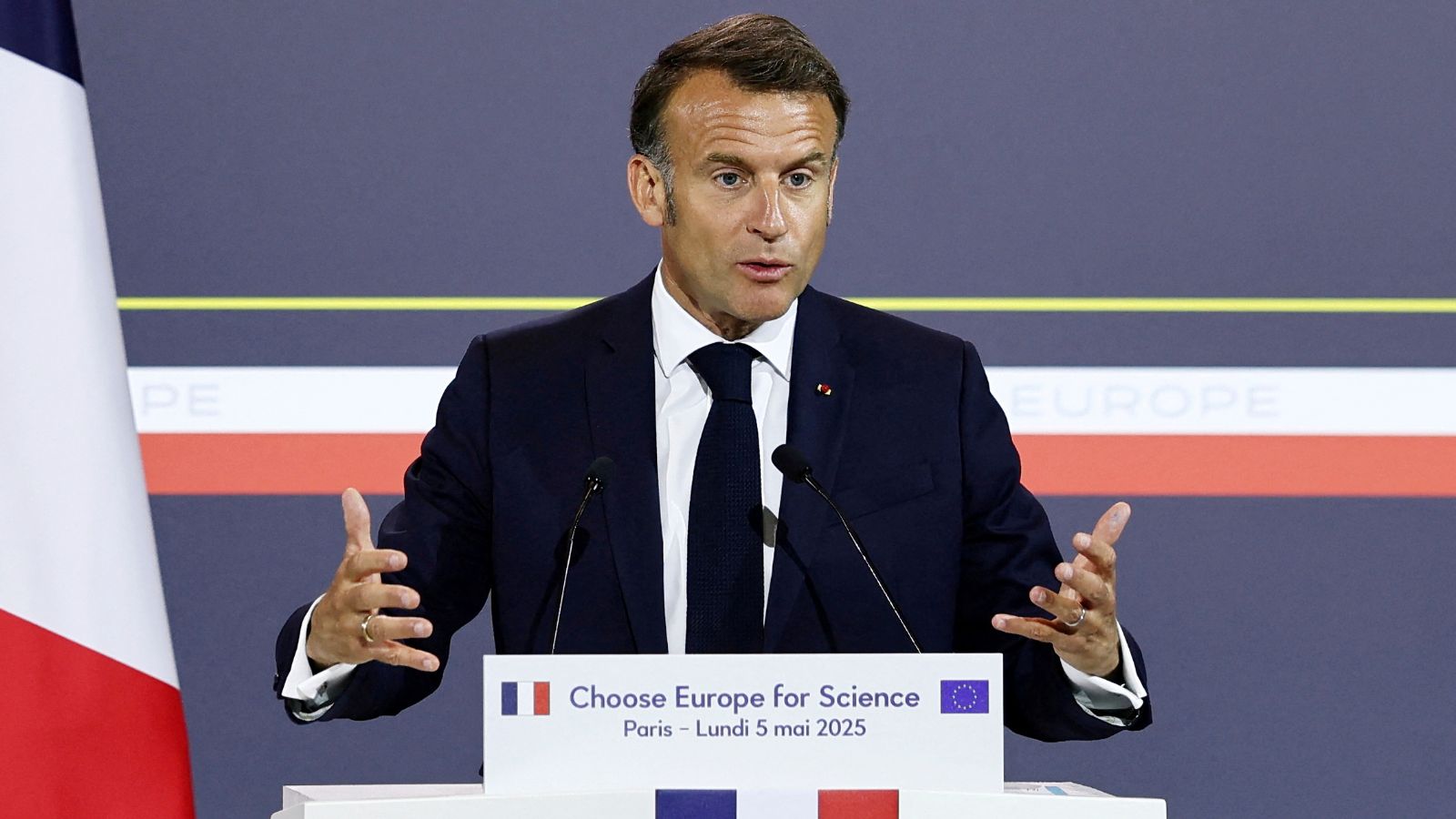French President Emmanuel Macron and European Commission President Ursula von der Leyen are hosting a high-profile conference at Paris’s Sorbonne University aimed at luring US-based academics and researchers alarmed by growing political interference in American higher education.
The event, Choose Europe for Science, comes amid fears of deep US government funding cuts to universities and research programs, and intensifying political attacks on institutions over diversity policies and pro-Palestinian activism.
Thirteen European countries, including France, Germany, and Spain, have called on the European Commission to act quickly to attract threatened academic talent.
“Nobody could imagine a few years ago that one of the great democracies of the world would eliminate research programs on the pretext that the word ‘diversity’ appeared in its program,” Macron said, according to a translation provided by a French official.
Speaking before Macron, von der Leyen proposed a EUR 500 million (Rs 47 billion) package to be spent over the next two years “to make Europe a magnet for researchers” and to support those who choose to relocate. “Europe must remain the home of academic and scientific freedom,” she said. “We must do everything we can to uphold it, now more than ever before.” While she avoided naming the United States, von der Leyen referred to a world where “fundamental, free and open research is questioned.”

The Trump administration has taken a combative stance toward US universities, seeking drastic cuts to federal research funding and cracking down on scholarship areas such as vaccination and climate change. On May 2, the White House issued a preliminary request to slash USD 4.7 billion (INR 39,245 cr) – more than half – of one agency’s USD 9 billion (INR 75,150 cr) budget. That followed two waves of grant cancellations in April and similar cuts across other public agencies.
Visa revocations for foreign students and researchers have added to the pressure. Pro-Palestinian international students have been arrested and held in detention centers, often without due process. Universities, meanwhile, face pressure to discipline faculty critical of the Gaza war.
Story continues below this ad
The intensifying standoff has unsettled many researchers. On April 14, Harvard University rejected a series of demands from the Trump administration; within hours, the Department of Education froze nearly USD 2.3 (INR 19,205 cr) billion in federal funding for the school.
Earlier this year, the administration froze USD 400 million (INR 3,340 cr) in funding to Columbia University, which was at the centre of protests against the war in Gaza. Several universities have also received “stop work” orders – directives to suspend federally funded research projects. According to Cornell University President Michael I. Kotlikoff, the school received over 75 such orders from the US Department of Defense as of April 8.
Top scientific agencies, including the National Oceanic and Atmospheric Administration, the National Science Foundation, the Centers for Disease Control and Prevention, and the National Institutes of Health, have also seen staff dismissed.
Alarm within the academic community is growing. In March, more than 1,900 members of the National Academies of Sciences, Engineering and Medicine signed an open letter warning of the “danger” posed by the Trump administration’s attacks on science.
Story continues below this ad
Macron warned that the US model, which relies “so heavily on science (and) on innovation,” is under threat. “Without free scientific inquiry, we lose… pillars of our societies which are the very heart of western liberal democracies, first and foremost of which is our relationship with the truth.”
He pledged an additional EUR 100 million by the end of the decade to support efforts to attract researchers to France, though neither he nor von der Leyen specified how the funds would be used.
The Sorbonne gathering is the latest in a series of European efforts to attract US academic talent. In April, Macron publicly invited American university staff to “choose France,” and announced a funding program to support the relocation of foreign scientists.
Other countries are moving quickly. The UK is preparing to launch a GBP 50 million program to attract global research talent, according to The Financial Times. In Germany, coalition negotiations between conservatives and Social Democrats include plans to bring in as many as 1,000 researchers.
The European Research Council, which funds scientific research across the EU, told Reuters it would double its relocation grant to EUR 2 million (USD 2.16 million or INR18.04 cr) per applicant.
Story continues below this ad
Despite decades of effort, Europe has long struggled to rival the US in research and innovation due to regulatory hurdles, lower funding, and weaker connections between universities and the private sector. France, while home to top scientific institutions, has seen many graduates depart for the US., leaving the continent lagging in fields like AI and cloud computing.
According to Eurostat, combined spending by EU businesses, governments, and universities on research and development totalled USD 411 billion (INR 3,431,850 cr)
in 2023. In comparison, US. spending reached an estimated USD 940 billion, according to the National Center for Science and Engineering Statistics.
Harvard alone, with an endowment of USD 53.2 billion (INR 444,220 cr), dwarfs Oxford’s USD 10.74 billion (INR89,679 cr), the highest in the UK and Europe.
Story continues below this ad
“I don’t foresee a rapid build-up of additional scientific capability that could match what the US now has … for several decades,” said Michael Oppenheimer, professor of geosciences and international affairs at Princeton University to Reuters.
Still, European leaders view this moment as a rare opportunity. Aix-Marseille’s Safe Place for Science program is already interviewing around 300 candidates. Other universities across the continent have launched similar initiatives.
“We have to make it easier and more attractive to come to Europe,” von der Leyen said, urging faster visa processing for scientists and researchers. “We are choosing to be the continent where universities are pillars of our societies and our way of life, where global talent is welcomed.”
